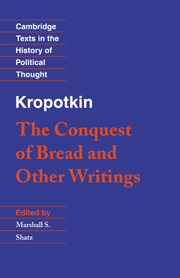Book contents
- Frontmatter
- Contents
- Introduction
- Principal events in Kropotkin's life
- Bibliographical note
- Biographical synopses
- The Conquest of Bread
- Preface
- Our riches
- Well-being for all
- Anarchist communism
- Expropriation
- Food
- Dwellings
- Clothing
- Ways and means
- The need for luxury
- Agreeable work
- Free agreement
- Objections
- The collectivist wages system
- Consumption and production
- The division of labour
- The decentralization of industry
- Agriculture
- Other writings
- Index
- Cambridge Texts in the History of Political Thought
Anarchist communism
Published online by Cambridge University Press: 05 June 2012
- Frontmatter
- Contents
- Introduction
- Principal events in Kropotkin's life
- Bibliographical note
- Biographical synopses
- The Conquest of Bread
- Preface
- Our riches
- Well-being for all
- Anarchist communism
- Expropriation
- Food
- Dwellings
- Clothing
- Ways and means
- The need for luxury
- Agreeable work
- Free agreement
- Objections
- The collectivist wages system
- Consumption and production
- The division of labour
- The decentralization of industry
- Agriculture
- Other writings
- Index
- Cambridge Texts in the History of Political Thought
Summary
Every society, on abolishing private property will be forced, we maintain, to organize itself on the lines of communistic anarchy. Anarchy leads to communism, and communism to anarchy, both alike being expressions of the predominant tendency in modern societies, the pursuit of equality.
Time was when a peasant family could consider the corn it sowed and reaped, or the woollen garments woven in the cottage, as the products of its own soil. But even then this way of looking at things was not quite correct. There were the roads and the bridges made in common, the swamps drained by common toil, the communal pastures enclosed by hedges which were kept in repair by each and all. If the looms for weaving or the dyes for colouring fabrics were improved by somebody, all profited; and even in those days a peasant family could not live alone, but was dependent in a thousand ways on the village or the commune.
But nowadays, in the present state of industry, when everything is interdependent, when each branch of production is knit up with all the rest, the attempt to claim an individualist origin for the products of industry is absolutely untenable. The astonishing perfection attained by the textile or mining industries in civilized countries is due to the simultaneous development of a thousand other industries, great and small, to the extension of the railroad system, to inter-oceanic navigation, to the manual skill of thousands of workers, to a certain standard of culture reached by the working classes as a whole – to the labours, in short, of men in every corner of the globe.
- Type
- Chapter
- Information
- Kropotkin: 'The Conquest of Bread' and Other Writings , pp. 31 - 40Publisher: Cambridge University PressPrint publication year: 1995
- 1
- Cited by



